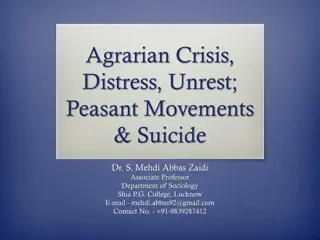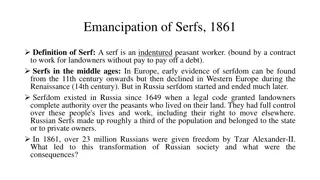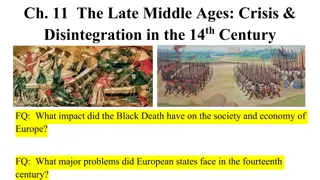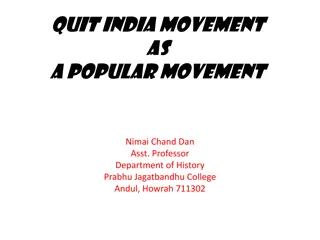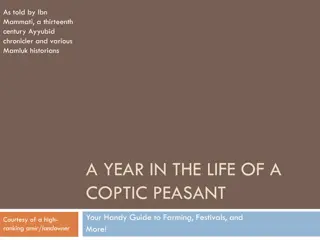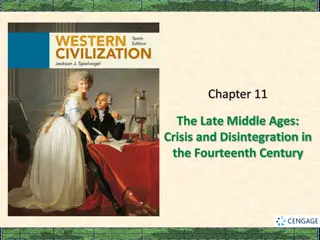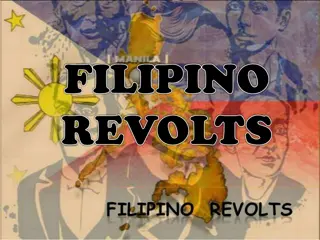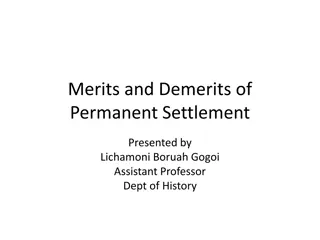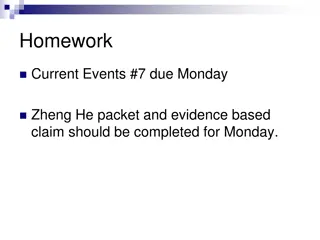Agrarian Crisis, Distress, Unrest; Peasant Movements & Suicide
Agrarian crisis in India is deepening, leading to distress among farmers and sparking peasant movements. Factors such as climate dependence, land loss, and lack of government support are exacerbating the situation. Farmer suicides are on the rise due to massive indebtedness. The impacts are far-reac
2 views • 43 slides
A.R. Desai: Contributions to Indian Nationalism and Sociology
A.R. Desai, a prominent figure in the field of sociology, made significant contributions to Indian nationalism and the study of society in India. His works focused on topics such as the social background of Indian nationalism, peasant movements, path of development, and Marxist democratic rights. De
5 views • 14 slides
The French Revolution and Napoleon: Unfolding of a Historic Era
The French Revolution, marked by political crises, revolts, and the rise of Napoleon, unfolded through phases of moderation, radicalism, and reaction. Peasants revolted against nobles, Paris became a revolutionary center, and the National Assembly acted to end aristocratic privileges. Explore the tu
2 views • 24 slides
Emancipation of Serfs in Russia: Causes and Consequences
The Emancipation of Serfs in Russia in 1861 marked a significant transformation in society. Influenced by various factors such as the Crimean War, pressure from nobles and intellectuals, growing peasant uprisings, and economic motives, Tsar Alexander II abolished serfdom. This decision aimed to alle
3 views • 11 slides
Revenue Reforms and Taxation Policies of Muhammad bin Tughlaq
Muhammad bin Tughlaq, known for his wisdom, implemented bold reformative measures in his rule. He initiated revenue reforms by assessing the country's income and expenditure through the compilation of province-wise registers. However, his decisions, such as increasing taxation in the fertile Doab re
0 views • 12 slides
Impact of the Black Death on the Late Middle Ages in Europe
The Black Death had a profound impact on European society and economy in the 14th century, causing social and economic upheaval, labor shortage, increased wages, and anti-Semitic sentiments. It also led to peasant revolts and the disintegration of medieval life, ultimately contributing to the breakd
5 views • 10 slides
Overview of Quit India Movement and its Phases
The Quit India Movement was a significant event in India's struggle for independence, marked by various factors leading to its emergence, including the demise of the Civil Disobedience Movement and the rise of nationalist sentiments. The movement escalated in response to the outbreak of World War II
1 views • 9 slides
Evolution of Livestock-Based Livelihoods in Peasant Farming
Livestock-based livelihoods have evolved significantly in peasant farming, where individual farmers own, manage, and organize their entire farms. Advantages include better supervision, increased employment opportunities, greater productivity, and quick decision-making abilities. However, challenges
0 views • 6 slides
Oceanus: The Titan God of Water and Rivers
Oceanus, the Titan god born of Uranus and Gaea, is the original source of water in Greek mythology. He is the god of the Okeanos, a vast river encircling the world and connecting realms. Married to Tethys, his sister, they had thousands of children, Oceanids and river spirits. Oceanus, depicted in a
0 views • 10 slides
A Year in the Life of a Coptic Peasant: Farming, Festivals, and More!
Explore the agricultural calendar of a Coptic peasant through the eyes of thirteenth-century chroniclers as they navigate farming tasks, festive celebrations, and governmental dealings. From seed collection to tax submissions, experience the rituals, traditions, and challenges faced by peasants in a
0 views • 29 slides
The Late Middle Ages: Crisis and Disintegration in the Fourteenth Century
The fourteenth century in Europe was marked by the devastating impact of the Black Death, economic dislocation, social upheaval, and political instability. The bubonic plague wiped out a significant portion of the population, leading to labor shortages and peasant uprisings. The decline of the papac
1 views • 24 slides
The Inspiring Tale of Joan of Arc
Joan of Arc, a young peasant girl who couldn't read or write, led armies and inspired a nation before facing enemies who ultimately took her life. Despite being labeled as mad or a witch, she exemplified courage and dedicated herself to serving her country through hard work and dedication.
0 views • 8 slides
Filipino Revolts Against Spanish Colonial Rule in the Philippines
The Filipino revolts against Spanish colonial rule in the Philippines were driven by various causes such as the desire to regain lost freedom, Spanish oppression, hated tribute, forced labor, religious persecution, agrarian disputes, and more. These revolts occurred at different times in various reg
0 views • 15 slides
Unintended Consequences of Meaningful Use in Healthcare Systems
In the world of healthcare IT, the implementation of Meaningful Use standards can lead to various unintended consequences such as audit failures, vendor failures, and employee revolts. Issues like incomplete documentation, late vendor deliveries, and weak solutions to provider challenges can disrupt
0 views • 16 slides
Analysis of Permanent Settlement in British India
The Permanent Settlement introduced by Lord Cornwallis in 1793 empowered zamindars to collect revenue, causing peasants to become tenants. While it provided security, it led to various issues such as high land revenue, conflicts, and hereditary landlords. The system failed to satisfy the British, za
0 views • 8 slides
Chinese Nationalist Revolution: Prelude to Internal Tensions and Imperialism Redux
Prelude to the Chinese Nationalist Revolution explores the backdrop of internal tensions and Imperialism in China from 1895 to the early 1900s. The period witnessed a series of revolts against Manchu authority, including the Taiping Rebellion and self-strengthening efforts to adopt Western technolog
0 views • 30 slides
Early Modern European Rebellions: Causes and Consequences
Explore the intricate tapestry of early modern European rebellions, delving into the socio-economic pressures, religious conflicts, and political upheavals that shaped this tumultuous period. Uncover the various forms of riot and rebellion, from aristocratic revolts to popular protests, and unravel
0 views • 23 slides
Decline and Rise: The Ming Dynasty and Zheng He's Voyages
The decline of the Yuan Dynasty marked by corruption and peasant rebellions led to the rise of the Ming Dynasty under Ming Hongwu. The Ming Dynasty brought stability through centralized governance, civil service exams, and land redistribution. Yung Lo, also known as Yongle, expanded China and sponso
0 views • 9 slides
